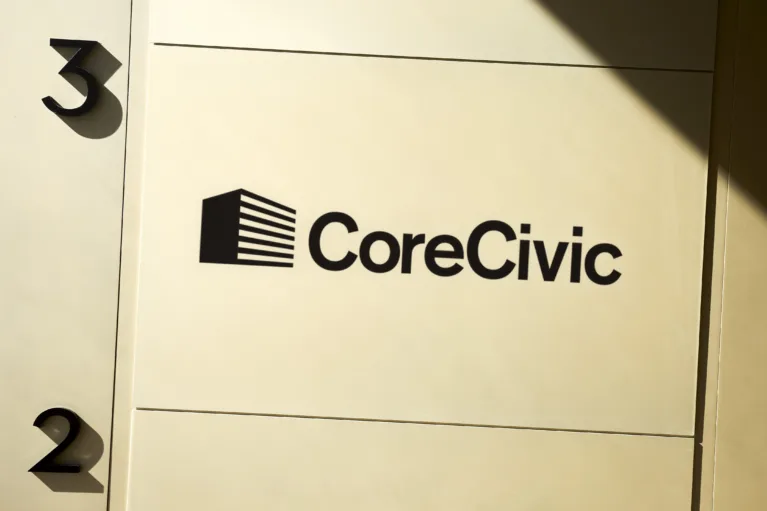Breaking
CoreCivic CEO: Trump Administration Plans Will ‘Supercharge’ the Private Prison Industry
In a quarterly earnings call, the private prison company told investors that it plans to expand its operations across the country.

This week’s private prison earnings calls make clear that Trump’s racist reign of terror has been great for business.
“I would like to share how excited I am for and deeply proud of our team here at CoreCivic,” the company CEO, Damon T. Hininger, told investors on today’s call. “Our team has always been mission and outcomes-focused, but this is such a significant moment of time in our company’s history. Never in our 42-year company history have we had so much activity and demand for our services as we are seeing right now.”
Hininger said that the company “exceeded its expectations for revenue and profit during the first quarter.” Yesterday, GEO Group, another private prison company, expressed its excitement about mass detentions and deportations of immigrants.
In addition to immigration lock-ups, CoreCivic operates jails, prisons, and “residential reentry centers,” also known as halfway houses.
“We do feel like there’s going to be a big push by this administration and DOJ leadership to really supercharge the capacity available in the private sector for community beds to really fulfill the goals and the intent of the First Step Act,” Hininger said on the call.
Trump signed the First Step Act during his first term. The legislation lets some federal prisoners shorten their sentences by participating in programming, such as therapy or drug treatment programs. Last year, the director of the federal Bureau of Prisons told a congressional committee that many people eligible for early release remained incarcerated due to a lack of space at halfway houses, although attorneys representing federal prisoners have argued that the BOP has the authority to release people on home confinement and does not have to wait for bed space to open up.
CoreCivic Chief Operating Officer Patrick D. Swindle said he is “optimistic” about potential business opportunities with the Bureau of Prisons on the “secure side,” referring to federal prisons.
“They’ve had challenges with infrastructure,” he said “It’s old and outdated, and they’ve had some staffing challenges. So we think we provide a great solution to be able to provide additional services to the BOP in our correctional facilities.”
The question-and-answer session began with a healthy dose of virtual back-slapping.
“Good afternoon, gentlemen,” a participant from private equity firm Noble Capital said. “Congrats on the quarter.”
CoreCivic’s total revenue for the first quarter of 2025 was $488.6 million, with a net income of $25.1 million, according to a company press release. CoreCivic has entered into agreements with ICE for a 1,033-bed facility in Leavenworth, Kansas, and a 2,560-bed facility in California City, California.
The company has also reopened a 2,400-bed lock-up in Dilley, Texas, under a new agreement with ICE. Last year, the federal agency terminated its contract with CoreCivic, citing its high operating costs. At the time the facility was closed, it only held adult males, but it had previously locked up families. The Texas Tribune reported that a company spokesperson said, “I can acknowledge that we anticipate housing families at this facility.”
CoreCivic estimates the Dilley jail will bring in $180 million annually. In the first year of his presidency, Biden stopped the practice of detaining families, which began under President Ronald Reagan.
CoreCivic is notorious for operating dangerous jails and prisons. Recently, the company has come under fire after a Milwaukee Journal-Sentinel investigation revealed that one of its employees may have had a role in sending gay makeup artist Andry José Hernández Romero to El Salvador’s Terrorism Confinement Center (CECOT), which some have likened to a concentration camp.
The company’s executives did not discuss Hernández Romero’s case, although Hininger said he did not view foreign prisons as competition. The Appeal planned to ask about Hernández Romero’s case, but the company did not call on The Appeal during the question-and-answer session.
Hininger told investors that a “significant component” of the company’s “broader ICE activation plan involves adding capacity for detainee transportation.” He said that over the past four months, CoreCivic had purchased a total of 120 vehicles, a combination of buses and vans.
“This is a significant increase in our fleet, and we believe this capacity will be necessary to accommodate ICE transportation requirements,” he said. Hininger said that in his almost 33 years with the company, “I’ve never seen the intensity and activity on ICE’s part to secure capacity.”
